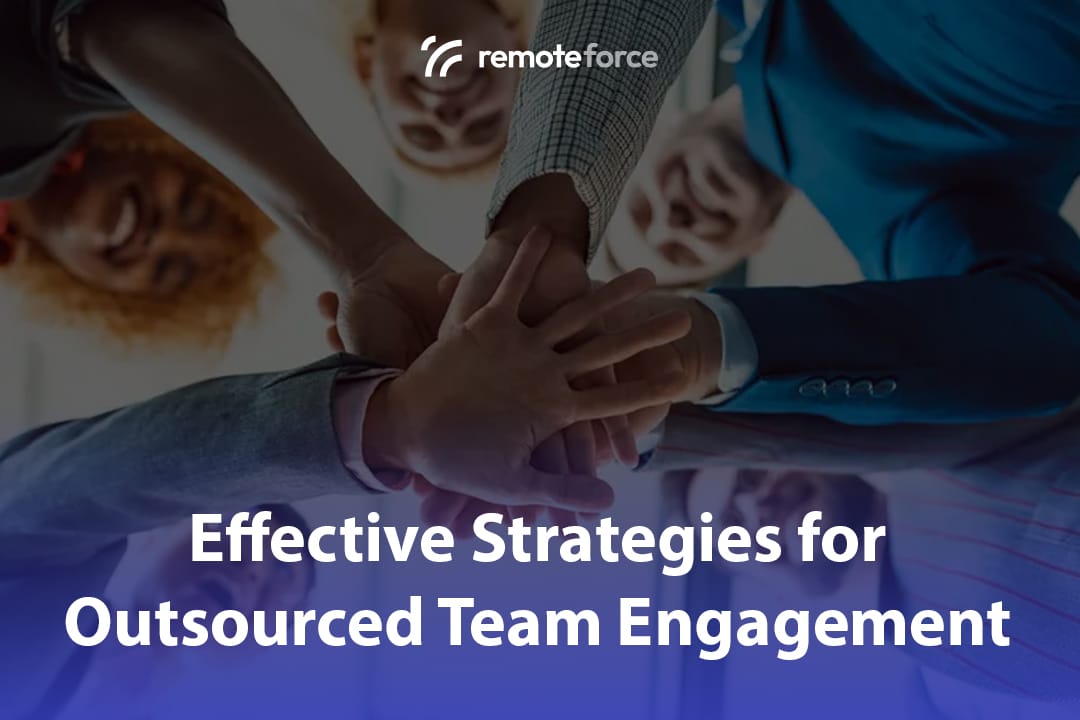You’ve successfully outsourced a team of skilled professionals—perhaps digital marketers, web developers, or accountants. The contracts are signed, the deliverables are defined, and the work has begun. But soon, you notice a gap. The team completes tasks, but they don’t offer new ideas. They follow instructions, but they don’t take initiative. They are productive, but they aren’t true partners.
This is the classic sign of a disengaged outsourced team.
Engagement is the emotional and intellectual commitment an employee has to your organization’s goals. For outsourced teams, it’s the difference between a transactional service and a strategic partnership. Building this engagement is one of the most high-impact investments a client can make.
Table of Contents
ToggleWhy Engagement Is a Non-Negotiable for Outsourcing Success?
A disengaged outsourced team is a hidden liability. While they may meet the bare minimum of their SLA, they create underlying problems:
- Reactive, Not Proactive: They wait for instructions instead of anticipating needs and suggesting improvements.
- Lower Quality Work: A lack of connection to the project’s purpose can lead to corner-cutting and a “good enough” mentality.
- Zero Innovation: You miss out on valuable insights and ideas from experts who could be improving your processes.
- Higher Turnover: Disengaged employees are more likely to leave, leading to knowledge loss and onboarding costs.
In contrast, an engaged outsourced team becomes a strategic asset. They are:
- Problem Solvers: They actively look for ways to overcome challenges.
- Brand Ambassadors: They care about your company’s success and the quality of their output.
- Innovators: They contribute fresh perspectives and ideas for improvement.
- Reliable Partners: They are committed to the long-term success of the partnership.
Actionable Strategies to Build Strong Engagement
Engagement isn’t accidental; it’s built through intentional, consistent effort. Here’s how to do it effectively.
1. Integrate, Don’t Isolate
The number one rule is to treat your outsourced team like a part of your own. Isolation is the fastest way to kill engagement.
- Unified Communication Channels: Add them to your primary communication tools like Slack or Microsoft Teams. Create shared channels for projects so they are part of the real-time conversation, not just an email address.
- Include Them in Team Rituals: Invite them to virtual team meetings, daily stand-ups, project kick-offs, and even virtual social events. This helps build personal connections and a sense of belonging.
- Proper Introductions: Formally introduce outsourced team members to your in-house staff. Explain their roles and how they fit into the larger team structure.
2. Connect Their Work to Purpose (The “Why”)
No one is motivated by completing tasks in a vacuum. Context and purpose are powerful drivers of engagement.
- Share the Big Picture: Don’t just assign a task like “design a new landing page.” Explain the goal: “We’re launching this landing page to support a major new product release that we expect will increase Q4 revenue by 15%.”
- Show Them the Impact: When their work leads to a positive result, share it! Show the web developer the analytics report on how the feature they built improved user retention. Share positive customer feedback with the secretarial support staff.
- Explain the “Who”: Help them understand the end customer they are serving. This builds empathy and a stronger commitment to quality.
3. Empower Them with Trust and Autonomy
You hired experts for a reason—so let them be experts. Micromanagement is a sign of distrust and a guaranteed engagement killer.
- Focus on Outcomes, Not Methods: Define the desired result (the “what”) and the deadline, but give them the autonomy to determine the best way to get there (the “how”).
- Encourage Problem-Solving: When they encounter a roadblock, ask, “What do you think is the best solution?” instead of immediately providing one. This fosters a sense of ownership.
- Delegate Decision-Making: Allow them to make decisions within their defined scope of work. This builds confidence and shows that you value their judgment.
4. Implement a Culture of Recognition and Appreciation
Feeling valued is a universal human need. Recognition shouldn’t be reserved for in-house employees.
- Give Specific, Timely Praise: A simple, direct message like, “Great job on the market analysis report today, Sarah. Your insights on competitor strategy were incredibly helpful,” is far more effective than a generic “thanks.”
- Public Shout-Outs: Acknowledge their contributions in a team meeting or a shared Slack channel. This not only boosts their morale but also shows your in-house team that you value your partners.
- Celebrate Wins Together: When a project is successfully completed, make sure to celebrate the achievement with everyone involved, both in-house and outsourced.
The Role of a Great Outsourcing Partner
While the client drives the daily engagement, a top-tier outsourcing vendor like RemoteForce lays the groundwork for it. We ensure our professionals are supported with competitive compensation, career development, and a positive company culture, making them ready and eager to integrate and contribute to your success from day one.
Building engagement with your outsourced team is an ongoing process, not a one-time task. It requires a strategic shift from a “client-vendor” mindset to a “one-team” culture. By integrating them, connecting their work to a larger purpose, empowering them with trust, and recognizing their value, you transform a simple service agreement into a powerful engine for innovation, quality, and sustained business growth.




